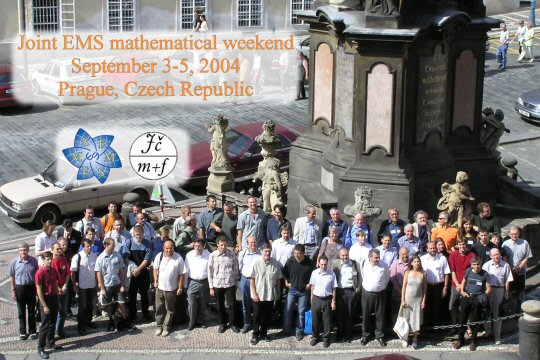Joint EMS mathematical weekend
The Czech Mathematical Societyand The European Mathematical Society organizeJoint EMS mathematical weekendSeptember 3-5, 2004, Prague, Czech Republic |

|
Europe has a long tradition in Mathematics. The development of Mathematics in Europe was almost always on a national, or even regional, basis. One should therefore speak of "traditions" rather than a single "tradition" in Mathematics in Europe. This was of course a reflection of the political disputes and cultural differences among the many european nationalities. However, the last two decades have witnessed major changes in these state of affairs: many of the political conflicts have disapeared and the information revolution has broken national barriers. Meanwhile, a European sense of identity is slowly growing. The European Mathematical Society (EMS) has helped bringing these changes to the European mathematical community through its various activities, including the organization of meetings and workshops, such as the European Congress of Mathematics and the EMS Summer Schools.
We follow the scenario suggested by EMS on series of smaller, more frequent, meetings in specific areas of mathematics: the EMS Mathematical Weekends. They offer a chance for European and other mathematicians working in related areas to get together and interact on a more permanent basis. This is the second meeting in a newly established series, following the first EMS Mathematical Weekend organized by the Portugese Mathematical Society in Lisbon in 2003.
Plenary lectures
- Eduard Feireisl (Czech Academy of Sciences, Prague):
On the mathematical theory of viscous compressible fluids - Errico Presutti (Universita di Roma "Tor Vergata", Italy):
Probabilistic and variational methods in problems of phase coexistence - Alexander A. Razborov (Institute for Advanced Study,
Princeton, U.S.A. / Steklov Mathematical Institute, Moscow, Russia):
Some Current Trends in Proof Complexity - Jan Saxl (University of Cambridge, United Kingdom):
Some recent applications of the classification of finite simple groups
Conference photo

Forthcoming mathematical weekend
will be held in Barcelona, September 16-18, 2005Programme
| Friday, September 3 | |||||||||
| 14:00 | Opening ceremony | ||||||||
| 14:30 | Plenary lecture Jan Saxl (University of Cambridge, United Kingdom): Some recent applications of the classification of finite simple groups | ||||||||
| 15:30 | Coffee break | ||||||||
| 16:00 |
| ||||||||
| 18:00 | MVS-JCMF business meeting | ||||||||
| Saturday, September 4 | |||||||||
| 9:00 | Plenary lecture Eduard Feireisl (Czech Academy of Sciences, Prague): On the mathematical theory of viscous compressible fluids | ||||||||
| 10:00 | Coffee break | ||||||||
| 10:30 |
| ||||||||
| 12:30 | Lunch break | ||||||||
| 14:30 | Plenary lecture Errico Presutti (Universita di Roma "Tor Vergata", Italy): Probabilistic and variational methods in problems of phase coexistence | ||||||||
| 15:30 | Coffee break | ||||||||
| 16:00 |
| ||||||||
| 18:00 | Conference dinner | ||||||||
| Sunday, September 5 | |||||||||
| 9:00 | Plenary lecture Alexander A. Razborov (Institute for Advanced Study, Princeton, U.S.A. / Steklov Mathematical Institute, Moscow, Russia): Some Current Trends in Proof Complexity | ||||||||
| 10:00 | Coffee break | ||||||||
| 10:30 |
| ||||||||
Organizing committee
- Pavel Exner (Czech Academy of Sciences)
- Eduard Feireisl (Czech Academy of Sciences)
- chairing the session Mathematical Fluid Mechanics - Jiri Fiala (Charles University)
- Jan Krajicek (Czech Academy of Sciences)
- chairing the session Complexity of Computations and Proofs - Jan Kratochvil (Charles University)
- Roman Kotecky (Charles University)
- chairing the session Mathematical Statistical Physics - Jaroslav Nesetril (Charles University)
- chairing the session Discrete Mathematics and Combinatorics - Jiri Rakosnik (Czech Academy of Sciences)
Local information
The mathematical weeekend will take place in the newly reconstructed building of the School of Computer Science of Faculty of Mathematics and Physics, Charles University, which is located in the very historical Prague's quarter Mala Strana, just below the Prague Castle (see the photo).The accommodation can be reserved in nearby hotels and guest rooms in student residences upon request. A limited pool of reserved rooms will be offered in first come first serve manner.
There is no conference fee charged.
Acknowledgement
The meeting is organized by jointly by European Mathematical Society and Czech Mathematical Society - section of the Union of Czech Mathematicians and Physicists.We greatly appreciate support by Charles University in Prague - Faculty of Mathematics and Physics, Institute for Theoretical Computer Science (ITI) and by Research Training Network COMBSTRU - Combinatorial Structure of Intractable Problems.
